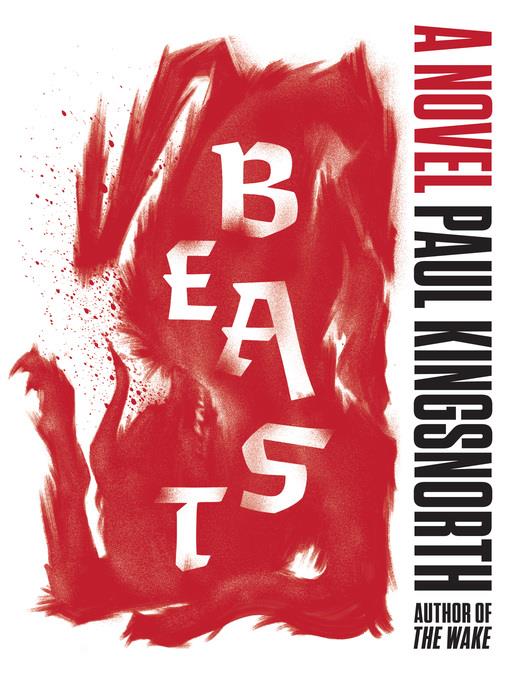
Beast
A Novel
کتاب های مرتبط
- اطلاعات
- نقد و بررسی
- دیدگاه کاربران
نقد و بررسی

June 12, 2017
Kingsnorth follows up The Wake with another daring novel. Edward Buckmaster has moved to a depopulated moor somewhere in England, having abandoned his wife and child a year earlier for a quasi-spiritual hermit existence. He wakes after a brutal storm with inexplicable lacerations on his side and a badly broken leg. As he wills himself to heal without assistance, he becomes obsessed with tracking a large, shadowy animal that he believes is stalking him. In between his meticulous searching, his thoughts become increasingly fragmented and he ignores all his bodily needs in his obsessive pursuit. Kingsnorth’s prose rushes on with a frenetic, almost unedited onslaught of garbled thoughts. This stream of consciousness works better if readers let it wash over them and take the slim book down in a single sitting. The blurring between reality and Edward’s distorted thinking is mostly effective, though the historical tangents don’t quite mesh with his disordered mind. Still, the novel richly rewards those who accept its demands with an impressionistic emotional wallop.

Starred review from June 1, 2017
A nightmare from the liminal world between sanity and insanity, between language and silence.Substantially shorter than the inaugural volume (The Wake, 2014) in a projected trilogy-cum-genealogical saga, Kingsnorth's latest also seems more assured. In part, that's because he writes in modern English rather than the Old English-ish tongue of the first book; in part it's because the concerns will seem immediate to modern readers: the world is going to hell, and about the only sensible approach to living in it is to go mad. Edward Buckmaster is a hermit in the woodlands of western England; he's tried the city and did not like it, so now he camps outdoors or inside a collapsing old barn. "On the high moor there are patterns and in my small mind there are patterns," he reflects, "and my breath fogs on the windows here and when I leave a footprint in the yard it stays for weeks." One pattern that Buckmaster sees is the inherent beastliness of the world: the lion hiding in the storm cloud, the serpent coiled in lightning. And literally: a hare with almost human eyes has been haunting him ever since he saw it under an ash tree, pausing as if to speak to him. Some other beast, Buckmaster fears, is descending upon him, and his special madness lies in trying to divine what it is: "Someone is waiting for me where the moor ends. I think there is much that I do not see." As Buckmaster unhinges, Kingsnorth's language becomes an onrushing torrent of words, long passages of internal monologue without much punctuation or capitalization: "the potato is disgusting my mouth is cracked and dry like glasspaper why did i eat a raw potato what a stupid thing to do." The effect is one of compelling immediacy as Kingsnorth recounts what it is to live in a time and place that is crumbling at the edges. A tour de force, reminiscent of the best of John Fowles and David Mitchell.
COPYRIGHT(2017) Kirkus Reviews, ALL RIGHTS RESERVED.

June 15, 2017
Wake, the first book in Welsh author Kingsnorth's (Confessions of a Recovering Environmentalist and Other Essays) generation- and genre-spanning trilogy, dizzyingly delved into the mind of lone protagonist "Buccmaster of Holland." Here, in the second book, the narrative bounces around the head of hermetic mystic Edward Buckmaster. Isolated in a dilapidated barn somewhere in England, Buckmaster is on a quest for an awakened state of consciousness. The story constantly shifts in and out of Buckmaster's dream state, blurring his descriptions and accounts of the world around him. When he spots an amorphous beast on one of his daily walks, his initial fear morphs into an obsessive, maniacal hunt for the creature. Kingsnorth's constant use of run-on sentences and dense prose pushes the reader deeper into the frenetic mind of the protagonist, heightening the novel's first-person point of view. VERDICT This follow-up to Wake does not disappoint. Kingsnorth's writing continues to mirror his protagonists, feral and unpredictable. Readers who enjoy the darkness of Cormac McCarthy's novels will find much to admire in this trilogy.--Joshua Finnell, Los Alamos National Lab., NM
Copyright 2017 Library Journal, LLC Used with permission.

Starred review from July 1, 2017
Flash-forward nine centuries from the world Kingsnorth depicted in acclaimed first novel, The Wake (2015). Much has changed. No longer focused on Anglo-Saxon Green Men waging desperate guerrilla war against their Norman overlords, this new narrative focuses on one Edward Buckmaster, a postmodern man living alone on England's western moors. But as in Kingsnorth's earlier novel, the human protagonist combats malign and threatening forces he ill understands. Unsettled by glimpses of a mysterious dark creature stalking him, Buckmaster sets out to find the beast. But his quest becomes far more than a search for an elusive moor animal. His leg injured, his stomach empty, his spirit tormented, his mind teetering on the edge of sanity, Buckmaster presses relentlessly toward the one prey that truly cannot escapehimself. Bit by agonizing bit, Buckmaster pries from his painful bodily experiences and his even more painful flights of imagination answers to his profoundest questions about what it means to be a man, a father, a lover, a mortal in a godforsaken, god-haunted polyverse. Readers who, like the protagonist, yearn for answers to such questions will find such by joining him in a psychological maelstrom. Daunting but rewarding, this dazzling work will burnish Kingsnorth's already luminous reputation.(Reprinted with permission of Booklist, copyright 2017, American Library Association.)

























دیدگاه کاربران